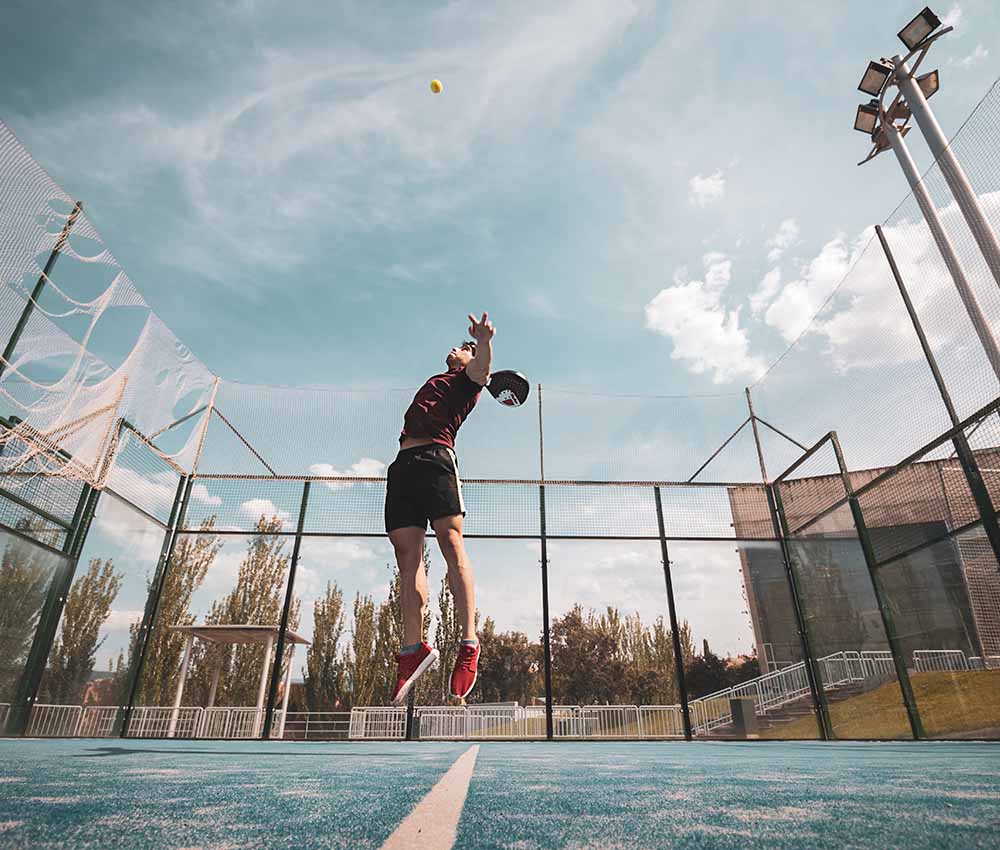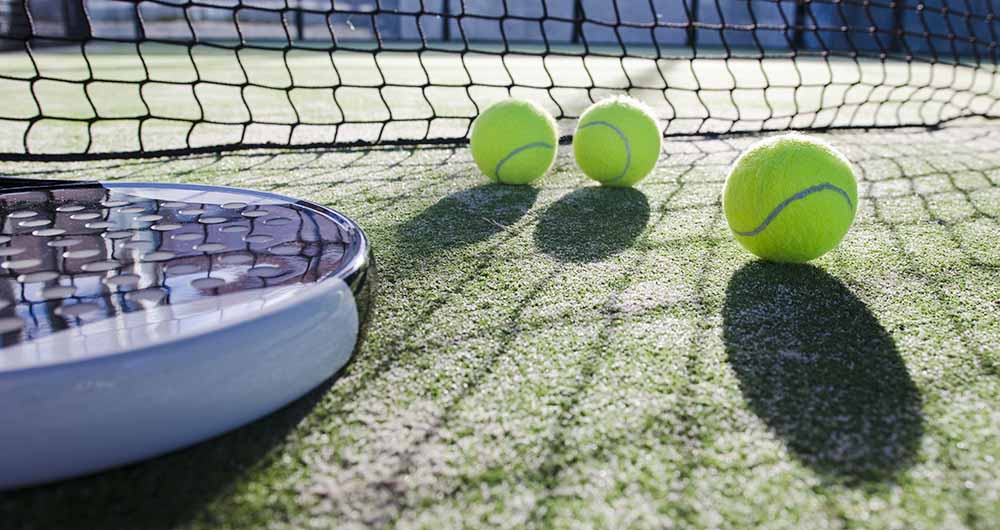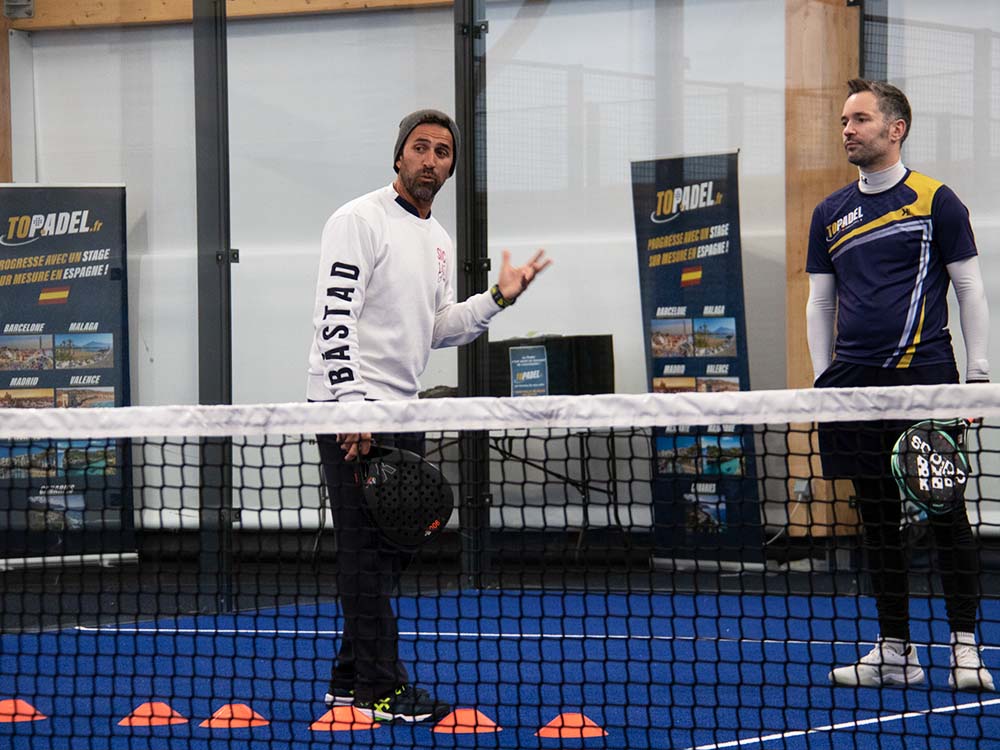HOW TO OPTIMIZE YOUR STAY AND PADEL LESSONS ? MAKING MAXIMUM PROGRESS IN MINIMUM TIME ?
KEY #1 : HOW MUCH TIME SHOULD YOU PLAY EVERY DAY ?
We often receive requests to play padel for entire days or, on the contrary, to have two 1-hour sessions of lessons per day during the stay. Let’s be clear and honest. In either case, it’s not ideal !

PLAYING FOR TOO LONG : KNOWING HOW TO MANAGE OVERTRAINING
Playing Padel for more than 4 hours a day has no benefit. This is true for amateur players, but even for professionals! Most players on the professional circuit, for whom it’s their job, only practice Padel for 1.5 to 2 hours per day during training or through practice matches. However, they spend just as much time in the gym to refine their physical condition – something that very few amateurs are willing to do! Yet, it is essential for developing the quality of their game (power, speed, endurance, explosiveness, etc.). Additionally, one must not forget about proper nutrition, stretching, and recovery.
Playing more than 2 hours per day can lead to overtraining, meaning that after a few days, you won’t be able to perform at your best. Furthermore, you become more susceptible to the risk of injuries due to accumulating fatigue (both mental and muscular). Overtraining is possible over a relatively short period, such as during a padel camp, but within reasonable limits. At ToPadel, we recommend 2 sessions of 2 hours in the morning and afternoon if you have two or more players on the court. And 2 sessions of 1.5 hours if you are alone. These sessions should be accompanied by sufficient breaks for stretching, lunch, and even a short nap! This is the ideal program to follow if your stay is no longer than 5 days. If you have the opportunity to be here for 5 to 10 days, we will add a half-day of recovery to your camp.
NOT PLAYING ENOUGH… AND EXPECTING RESULTS ?
Whether you’re an expert padel player or a novice, the learning cycle is the same for every human being ! You meet a coach who gives you new instructions. These instructions disrupt your habits and take you out of your comfort zone. As a result, you need to think about the movement, balance, posture… Your brain is in turmoil, and there’s work to be done before the new movement becomes a ‘reflex.’ There are, therefore, 3 stages to follow before integrating a new movement or correction into a match ! Let’s stop believing that we can ‘implement a change seen just that morning or the day before in the very next match !’ It’s a lie !
Step 1 : ‘Take the prescription : the repetition.’ Get the corrective information that the coach wants. Then repeat, repeat, and repeat, most often with identical balls from the basket. This is often the focus of the first session on a given theme: you receive the instructions, the ‘prescription,’ and you repeat this new movement from the basket to anchor it repeatedly.
Step 2 : ‘Integrate the movement into a pre-established routine : the alternation.’ During the second session on the same theme or after the repeated basket if you handle it without difficulty, the coach will start hitting various shots according to a repeated pattern. At first, it’s simple : A > B > A > B… then it becomes more complex. For example, A > B > C > D > A > B > C > D. This helps you move while following a routine where you anticipate the upcoming ball and, therefore, predict the different movements/corrections that are being observed, all while being in motion on the court. It’s an opportunity to correct any remaining minor issues.
Step 3 : ‘Match… in a directed way: the random.’ It’s during another session that you can start putting the practice into a more varied context: moving from predictable alternative balls to random ones. This way, your brain no longer anticipates the next ball! This approach brings you closer to typical playing conditions to see if you can execute your movement. Then, all that’s left is to apply it in your matches under pressure !
Without these 3 stages, which may take more or less time depending on the players and the corrections needed, you’re not ready to play a match. It’s not serious… and what’s more frustrating than thinking, ‘But I was doing much better with the coach !! But not in the match… Now you know why !
Understand that it takes a minimum of 2 to 3 sessions to address a corrective point in a part of your game. But rest assured, we cover different points in each session without spending 1.5 hours on the same movement. You accumulate different movements, and then you need multiple sessions to integrate them into your game ! To be completely honest with you, the essence of a good padel camp will never fully develop at the end of it. Instead, it occurs around 4 to 6 weeks later, after you’ve had 2 to 3 sessions per theme. This, of course, is true if you attempt to implement what you’ve learned in your padel lessons. Even if it means making more mistakes than usual ! After a good padel camp, people are generally frustrated! That’s a good sign. You feel like you’re regressing to then take a leap forward. The important thing is that you know what you want to achieve, you know how to achieve it, you try to reproduce the sensations you experienced during the lessons… but you’re not yet fully in control during matches ! Persist !

HERE ARE THE 4 MAIN AREAS OF THE GAME THAT ARE ADDRESSED IN A PADEL CAMP :
The attack
Involving forehand and backhand volleys. Also, smashes (bandeja, vibora, kicksmash, rulo…). The attack is a broad subject that can take up 2 to 4 sessions, especially if tactical aspects of playing at the net are covered to control the point effectively.
The defense
Including forehands, backhands, and managing shots off the walls parallel and diagonally (double walls…). Defense may also require 2 to 4 sessions. Many coaches emphasize this aspect of the game because in padel, the pair that wins the match is often the one making fewer mistakes and keeping the ball in play! It’s not always the team that hits the most winners that emerges victorious… quite the opposite ! Spanish coaches are particularly keen on this : ‘start by knowing how to defend !’
Transitions
‘Back > Front’ to gain the net position with lobs or chiquitas, ‘Front > Back’ to execute bajadas with forehand, backhand, cuchillas…
The serve
The service (which is relatively quick to cover, especially for experienced players) but, more importantly, the return of serves : knowing where to hit and how to play the returns.
We recommend a minimum of 7 sessions for a good camp. This would be a stay of 3 and a half days with 2 sessions per day.If you’re playing alone, we suggest 1.5 hours in the morning and 1.5 hours in the afternoon. For 2 players or more, 2 hours in the morning and 2 hours in the afternoon.
With this schedule, we can cover attack, defense, and transitions in 2 sessions each, totaling 6 sessions. The 7th session will focus on the serve and returns (this part can be addressed in a single session as it involves providing more tactical information).
However, if you can stay for a week, we usually try to complement this approach with additional group lessons, tactical sessions, or matches that may be guided by the coach. Beyond 7 days, we would include rest periods and a less intense pace to avoid overtraining over an extended period, which wouldn’t be optimal for your game. At ToPadel, we adapt to the duration of your stay, working with you to create the most comprehensive instructional camp to help you progress.
Of course, if there are specific points that trouble you in your Padel game, our coaches will be happy to reserve some sessions to address them. The above approach is comprehensive but general to cater to the majority of players seeking advice to improve their game, whether they are beginners or experts.
KEY #2 : ADDRESSING THE DEBATE : INDIVIDUAL LESSONS, GROUP LESSONS, OR MATCHES ?
MATCHES ARE NOT THE KEY TO IMMEDIATE IMPROVEMENT !
Our response is very clear. Many organizations include matches with ‘local players’ in their camp packages. However, how will these matches help you improve faster than playing with players from your own region/country, especially if their playing pace is not aligned with yours ? Let’s be honest: these matches are included because they are inexpensive to organize and fill the padel time that is being offered in the package.
At ToPadel, our mission is to help players progress and develop their Padel skills by connecting them with the best specialists in France and Spain. As a result, you will find few to no matches in our camp packages that last less than 5 days. We believe (as mentioned above) that you need to be guided and trained in all aspects of the game, and it takes around 2 to 3 sessions to begin seeing your progress in actual matches. However, we can always adapt to players who want to have fun and engage in friendly matches alongside their learning during the camp.

WHY DID WE MAKE THIS CHOICE ?
1 – THE REAL INTEREST OF MATCHES FROM A SPORTS PERSPECTIVE
It is challenging, on one hand, to organize good matches without having observed the players’ performance beforehand. Self-evaluation is difficult in padel, and the equivalences with Spain, in particular, are not comparable. Finding an interesting match for you, at the same skill level, within a short period of your stay… It’s more of a miracle than a testament to the professionalism of the facility hosting you !
2 – THE PEDAGOGICAL INTEREST
What’s the point of sending you directly into matches if we haven’t had time to follow the learning phases and reinforce your new movements? (see above). With stress and pressure, especially facing unknown and foreign players, you won’t be in the best mindset if we throw you into matches on the first day of the camp ! You will end up feeling frustrated. We need to analyze your game, give you the keys, and prepare you to play better before anything else. We do offer matches… but at the end of the camp, for those staying more than 5 days, to see if they can implement what they have learned and reviewed during the lessons. And if you stay less than 5 days, it’s when you return home, during your own games, that you’ll try to focus on what you have learned.
3 – MAKE THE MOST OF YOUR TIME ON-SITE TO BE COACHED !
Generally, players have limited time on-site. We must make the most of this time for your progress. An unguided match, without the coach’s input and at least tactical choices corrected, is not beneficial in itself. Given the significant importance of tactics in padel, we can have specific sessions focusing on this aspect alongside the lessons addressing your technique. Alternatively, you can receive real-time corrections if you go in a group with group lessons involving 3 or 4 people. We will advise you based on the size of your group.
We are not opposed to the idea of helping you find good padel matches on-site, but preferably towards the end of the camp when you are ready. This is because the time you dedicate to us will be focused on technical and tactical learning. Undoubtedly, matches or tournaments against unknown players enrich the player’s game experience, especially when the playing pace pushes you to perform at your best. That’s why we always follow this logic in our padel camps :
1 –
Specific lessons with the player(s)
2 –
Tactical sessions / game culture
3 –
Implementation in group lessons or matches directed by the coach
4 –
Matches with local players (if time permits)

